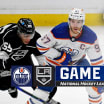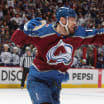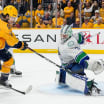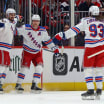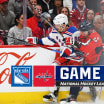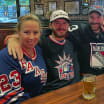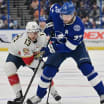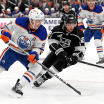There are endless arguments about which series in the history of the Stanley Cup Playoffs has been the most exciting. There are plenty of candidates, but when it comes to sheer endless drama, the NHL's first best-of-7 series gets a very high IQ -- as in Intensity Quotient.
The 1939 Semifinal between the first-place Boston Bruins and second-place New York Rangers is regarded by historians as a classic among classics for several reasons; most notably for the four sudden-death overtime games in the seven-game series. The first game, on March 21, 1939, went to triple overtime as did Game 7 on April 2.
First best-of-7 Stanley Cup Playoff was classic
Bruins-Rangers Semifinal in 1939 had intensity, animosity, unlikely hero
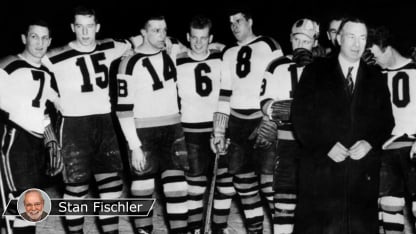
By
Stan Fischler
Special to NHL.com
The animosity between the big, bad Bruins of the pre-World War II era and the more classically oriented, less-belligerent Rangers had reached the white-hot stage.
RELATED: [Complete Stanley Cup Playoffs coverage]
"We really didn't like the Rangers," said center Milt Schmidt, a young Bruins star at the time. "We had some great battles with them, and sometimes instead of scoring goals, we also were in fights."
As an extra added attraction, this was an NHL first: Never before had there been a best-of-7 series. Previously, playoff series had been best-of-5 or best-of-3; before that, they were decided on total goals scored. But for the 1938-39 season, the NHL instituted best-of-7 series for the Semifinals and the Stanley Cup Final. They followed a 48-game season in which the Bruins finished 16 points ahead of the Rangers and set an NHL record with 74 points.
"Our defense was so strong," explained Bruins general manager-coach Art Ross, "that I ordered my forwards to play outside when backchecking against the opposing wings. Instead of driving the play to the outside, I had them driving it inside, toward the goal. That way, my forwards could be looking at their defensemen at all times and be ready for a pass or a loose puck."
The opening game at Madison Square Garden, then located on Eighth Avenue between 49th and 50th Streets, set the dramatic tone for the series. The even play was reflected in the 1-1 score after three periods of regulation time. It remained 1-1 through the first, then the second and into the third sudden-death overtime period.
Boston rookie forward
Mel Hill
, who had scored 10 goals during 1938-39, was hardly noticeable for most of overtime. But he was playing alongside the ever-dangerous Bill Cowley and Roy Conacher, each a future Hall of Famer.
As center, Cowley instinctively would seek Conacher for his passes. Logic dictated that if the Rangers suspected that Cowley would feed Conacher, Hill might be overlooked. Sure enough, with less than a minute remaining in the third extra period, Cowley entered the Rangers' zone and Hill found some unguarded ice near the crease. Cowley drifted into the corner and zipped a pass to Hill, whose shot eluded goalie Davey Kerr at 1:05 a.m. and gave Boston a 2-1 win in Game 1.
As disheartening as the loss had been for the Rangers, the medical news was worse; Kerr had injured his right shoulder in a collision with Conacher. X-rays revealed that the muscle attached to the shoulder bone was severed and that he would be unable to play for the rest of the series.
That left Rangers GM-coach Lester Patrick with a problem: Who would replace Kerr?
Patrick decided to elevate minor leaguer Bert Gardiner, who had played exactly one NHL game (in 1935-36). He allowed one goal and got the win but was returned to the minors.
Gardiner was in the crease for Game 2 at Boston Garden and held the Bruins to two goals through 60 minutes. But the Rangers managed to score just twice, sending the game into overtime tied 2-2. However, this time the end came quickly, again courtesy of the Hill-Cowley combination.
In a remarkable case of deja vu Cowley again orchestrated the play -- this time with a drop pass inside the New York zone -- and Hill supplied the winner, a 40-footer past Gardiner.
The confident Bruins riddled Gardiner in Game 3, winning 4-1 at Boston for their 11th consecutive victory. Bill Grimes of the Boston Evening Advertiser wrote that the Bruins were definitely in the Stanley Cup Final, "unless they get mixed up in a train wreck."
Not surprisingly, Patrick realized the challenge ahead. "The odds aren't very attractive, are they?" he said. "But our morale is still high and we have a game club.
"The job of taking four straight sounds hopeless, I suppose, but it can be done."
The Rangers rebounded at home in Game 4, winning 2-1. With their confidence restored, they returned to Boston, and the teams were into overtime tied 1-1. At 17:19 of OT, Rangers forward Clint Smith beat goaltender Frank Brimsek with a long shot to trim the deficit to 3-2.
"This gang has plenty of moxie," Patrick said. "To win in Boston in the face of that hostile crowd and play the way we did makes me proud."
Stanley Cup fever reached new highs for Game 6, with 16,630 fans overflowing Madison Square Garden. Although Rangers-killer Hill opened the scoring in the second period, the home side quickly responded. Phil Watson's goal late in the second period got the Rangers even, and goals by Bill Carse and Alex Shibicky in the third period gave New York a 3-1 win. No longer was Gardiner considered a pushover by the Bruins.
Whether it was overconfidence among the Bruins or simply a Rangers club that would not die, the series did not go as Boston had planned. By winning Games 4, 5 and 6, New York forced the series to the new limit -- a seventh and deciding game.
Boston Garden was packed for Game 7. The Bruins faced the potential ignominy of losing four in a row after winning first three games of the series.
"It was very trying but we had great players on our club, such as [defenseman Eddie] Shore, Cowley and Dit Clapper," Schmidt said. "They always reminded us that what we did during the year didn't count right now.
"We were playing for the Stanley Cup. You don't give 100 percent anymore; you give 125 percent, until it hurts. Then you know that you're giving. They reminded us of that all the time."
Ray Getliffe put the Bruins up at 15:52 of the second period, but Rangers defenseman Muzz Patrick tied the score less than two minutes later. The third period came and went without a goal. So did the first and second sudden-death periods. The game would be decided in the third overtime, after several earlier close calls.
Boston forward Bobby Bauer thought he had won the game two minutes into the first overtime when he beat Gardiner with a backhander, but the shot clanged off the post and out of danger.
The Rangers got their best chance when defenseman Babe Pratt had Brimsek at his mercy in front of the net but missed. New York's Bryan Hextall was foiled by a desperate Brimsek kick save.
As the third overtime was heading into its eighth minute, Shore skimmed a pass to Conacher, who fired a heavy shot at Gardiner. He made an athletic save and kept the play alive by steering the puck behind the net. However, Cowley outhustled New York's defensemen and got there first. Operating on instinct, Hill camped out in the slot. Cowley put a pass on Hill's tape, and the rookie forward beat Gardiner for the biggest goal of his young career.
Endlessly toasted by fans and teammates alike, Hill completed his once-in-a-lifetime evening by eventually leaving the Garden with teammates Schmidt, Conacher, Bauer and Woody Dumart.
"He was much too excited to sleep," wrote author Michael Hiam in "Eddie Shore and that Old-Time Hockey." "Mel walked the streets until six o'clock that morning trying to calm his nerves in the company of Patrolman James Travers, who was on his normal beat."
From that point on until his retirement from the NHL in 1946 and thereafter, Mel Hill was forever known as "Sudden Death."
The Rangers got their revenge a year later, defeating Boston in a six-game Semifinal (with Hill going scoreless in two games) before defeating Toronto in the Final for the Cup.
